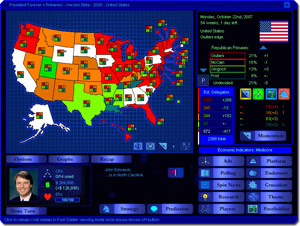Can Video Games Get People to Vote? (VG Series Part 8/10)
Neo-Academic coverage of the Journal of General Psychology special issue on the psychology of video games:
- Is Video Game Research Influenced by the Media?
- Does Personality Predict Vulnerability to Violence in Games?
- Can Spatial Cognition Be Trained with Video Games?
- How Do We Design Effective Video Games for Learning?
- Can Video Games Be Used in Health Care?
- Should Children with Autism Play Video Games?
- Should Video Games Be Used in Therapy?
- Can Video Games Get People to Vote?
- How Do Video Games Motivate People?
- How Do Typical Gamers Play Games?
![]() There are few topics so hotly debated on the Internet as the value of video games. Are they the next generation’s artistic advance, as film was for the last, or are they a blight that makes children overly aggressive and dangerous? In this 10-part series, I’m reviewing a recent special issue of the Journal of General Psychology on video games. For more background information, see the first post in the series.
There are few topics so hotly debated on the Internet as the value of video games. Are they the next generation’s artistic advance, as film was for the last, or are they a blight that makes children overly aggressive and dangerous? In this 10-part series, I’m reviewing a recent special issue of the Journal of General Psychology on video games. For more background information, see the first post in the series.
In the eighth article in this series by Bers (2010)1, we once again dip a little closer to my research area: serious games. If you haven’t heard this term before, serious games refers to games designed for purposes other than entertainment. This is a fuzzy definition. For example, consider the game Achievement Unlocked. The game itself is very simple; the player is represented by a small elephant, and the elephant’s goal is to get “achievements,” similar to the reward mechanic used on the XBOX 360. Most of these achievements are inane. For example, the player gets one achievement for starting the game, and another for clicking on the Mute button. Trying to decipher the sometimes ambiguous names of the achievements and then maneuver the elephant appropriately is certainly fun, and yet, this might be considered a serious game. The opening screen states, “You are about to metagame a game about metagaming.” The game’s creator is trying to communicate a message through the game. So is this a serious game, or isn’t it?
Regardless of this definitional ambiguity, the focus of this article, games for the purpose of civic engagement, certainly qualifies as “serious.” The purpose of such games is to improve outcomes ranging from “individual voluntarism to organizational involvement to electoral participation.”
There are many such games. Here are the ones Bers discusses:
- On the Campaign Trail is a game developed in 1987 by Kent State University to increase student civic knowledge.
- Democracy is a set of realistic political simulations.
- Power Politics and President Forever simulate life on campaign trail.
- Civilization and SimCity teach about resource management and the balancing act of city/nation management. I, for one, will never forget that you should not establish a police department until absolutely necessary.
- Superpower is a multiplayer game based in an online discussion board where players take the role of nation leaders. Click on that link to play it yourself.
- Balance of Power is a 1985 simulation of Cold War policy decisions, with similar themes to Crisis in the Kremlin and Conflict: Middle East Political Simulation.
- DOTCOM, sponsored by the U.S. Department of State, encourages “Armenian, American, and Azerbaijani youth in creating socially conscious media.”
- Quest Atlantis “embeds civic learning opportunities in the quest for students to find solutions to the problems faced by the fictional world Atlantis.” I’m not quite sure what that means.
- Zora allows students to create their own virtual cities for exploration, which has been used by Tufts University to expose new students to civic issues regarding campus (the program is called Active Citizenship Through Technology – ACT).
Civic events are also not limited to civic games, as demonstrated by protests over class issues in World of Warcraft and tax riots in Second Life.
As with the other studies I’ve covered, the only empirical results (and there aren’t many) are mixed. In one study, the ACT program improved attitudes about civic issues. But in a follow-up study, it does not seem to have any impact on “their development of civic and electoral indicators.” I assume that means behavioral change in regards to elections.
So my impression from this is that there is a great deal of enthusiasm for serious games targeted at civic outcomes, though there is not much empirical research. Little steps, right?
- Bers, M. (2010). Let the games begin: Civic playing on high-tech consoles. Review of General Psychology, 14 (2), 147-153 DOI: 10.1037/a0019490 [↩]
| Previous Post: | Should Video Games Be Used in Therapy? (VG Series Part 7/10) |
| Next Post: | How Do Video Games Motivate People? (VG Series Part 9/10) |



